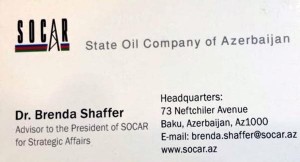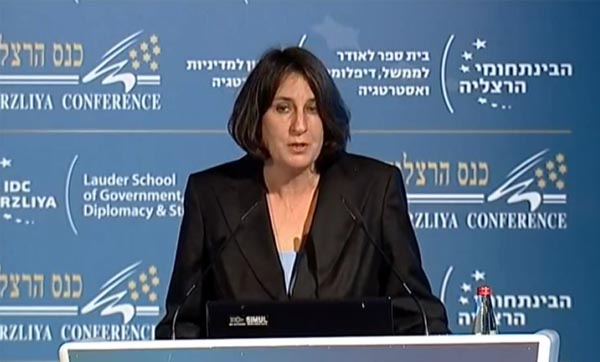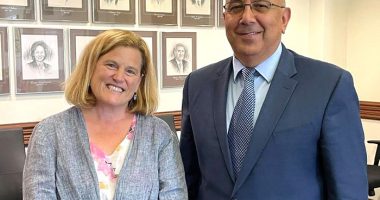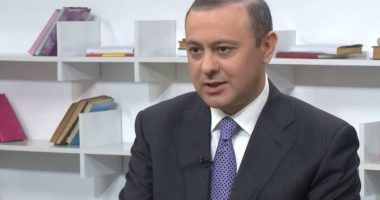By Carl Schreck
RFE/RL
WASHINGTON — A political scientist’s ties to Azerbaijan’s state-owned energy giant SOCAR sparked a testy exchange at a Columbia University discussion on European energy on October 23 when a student asked the scholar about her ties to the firm.
Brenda Shaffer, a professor at Israel’s University of Haifa, responded to a question about her failure to disclose her links to SOCAR by grilling her interlocutor — journalist and Columbia graduate student Casey Michel — about his cholesterol, love life, and finances.
“Part of the American way is a right to privacy,” Shaffer replied. “Like, if I asked you, Casey, ‘OK, what’s your wife’s name? What school do you go to? Who funds your scholarship right now? Where do you work? How do you pay your meals? … What’s your cholesterol count?’ There’s nothing to be ashamed of in any of those answers.”
The sharp response came during a question-and-answer session at an event titled “Southern Gas Corridor: Progress and Challenges” held in New York at Columbia’s Center on Global Energy Policy. The event’s main speaker was SOCAR Deputy Vice President Vitaliy Baylarbayov.
Michel asked Shaffer to address a decision by “The New York Times” to attach an editor’s note to her September 9 commentary on Azerbaijani-Armenian tensions, stating that the piece “did not disclose that the writer has been an adviser to Azerbaijan’s state-run oil company.”
Shaffer said she believes her students “benefit from the fact that I have been on every side of the table.”
But she accused Michel of ignoring the subject of her piece, namely “Russia’s intervention in the South Caucasus, and how they played a role in the loss of lives between both Armenians and Azerbaijanis and the danger that this is for the region and for U.S. policy.”
“You come in and try to…pick apart everything in my background or whatever. Why don’t you, instead of shooting the messenger, why don’t you look at my message?” Shaffer said.
Michel replied that he had no problem with the content of her article and repeated that he was interested in a comment on Shaffer’s failure to disclose her affiliation with SOCAR, according to an audio recording of the exchange made available to RFE/RL.
“Like I said, I’m not going to ask you your cholesterol count,” Shaffer said. “I mean, who pays your scholarship, Casey? How do you pay your tuition?”
The moderator of the event then steered the discussion back to the SOCAR-led Southern Gas Corridor, which Azerbaijan is pushing as a key route to lessening Europe’s reliance on Russian gas in the wake of the Ukraine crisis.
SOCAR Adviser
Azerbaijan’s critics have accused Baku of touting its role as an energy partner for Europe and the United States while downplaying its human rights record, which Western officials and rights groups say has deteriorated precipitously in recent months.

Shaffer, who is currently a visiting researcher at the Center for Eurasian, Russian, and East European Studies (CEREES) at Georgetown University, is among the most visible figures promoting this role for Azerbaijan in the media and in Washington.
As RFE/RL’s Robert Coalson reported in September, in many of these public appearances Shaffer does not mention that she has served as an adviser to SOCAR President Rovnag Abdullayev.
“The New York Times” attached its editor’s note to Shaffer’s op-ed after the newspaper was shown a photograph of her business card identifying her as an adviser for “strategic affairs” to the SOCAR president, according to the report.
Panelist Or Moderator?
Shaffer’s precise role at the Columbia University event this week was also unclear.
Shaffer was described as the “moderator,” according to an archived version of the announcement posted on the Center on Global Energy Policy’s website as recently as October 19.
The updated version, however, lists the moderator as Jesse McCormick, the center’s associate director, and does not mention Shaffer.
McCormick introduced Shaffer at the event as a “panelist,” prompting Shaffer to quickly correct him, according to a recording from the event.
“Moderator,” she said.
Ke Wei, the center’s program coordinator, referred questions about the decision to replace Shaffer as the listed moderator to an outside public relations firm, BerlinRosen. A message left with the firm seeking comment went unreturned on October 23.
Neither Shaffer nor SOCAR’s U.S. representatives responded to requests for comment.
Also unclear is the precise role that Columbia’s respected Harriman Institute for Russian, Eurasian, and East European Studies — where Michel is a second-year student — played in the SOCAR event.
Just days prior to the event, the institute’s website featured an announcement inviting those interested to join “the Center on Global Energy Policy and the Harriman Institute” for the discussion, according to an archived version of the page.
But that announcement, which also listed Shaffer as the moderator, was later scrubbed from the site.
Neither of the original announcements mentioned Shaffer’s affiliation with SOCAR.
Alexander Cooley, deputy director of the Harriman Institute, told RFE/RL that the institute “was not a co-sponsor of this event or even affiliated with it” and that the announcement on its website “was inaccurate and was removed to reflect our actual nonaffiliation with the event.”
Asked about printed promotional materials for the event that prominently mentioned both Columbia’s Center on Global Energy Policy and the Harriman Institute, Cooley said the institute had “no further comment on this matter.”











1 comment
She’s an idiot. She compares a question about if she’s PAID by the ENEMY STATE (Azerbaijan) to a question about CHOLESTEROL!?!? IDIOT! Anyway, BOTH questions should be happily answered in the spirit of transparency and following the professional ETHIC of full disclosure! IDIOT.
PS: My cholesterol is 199.